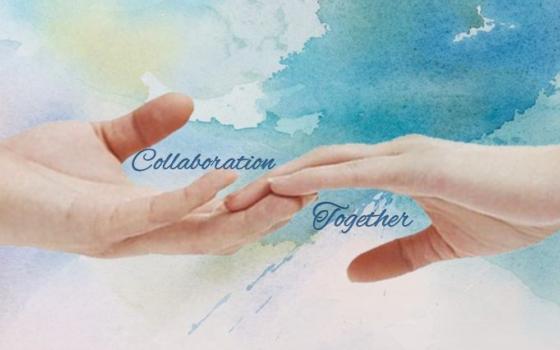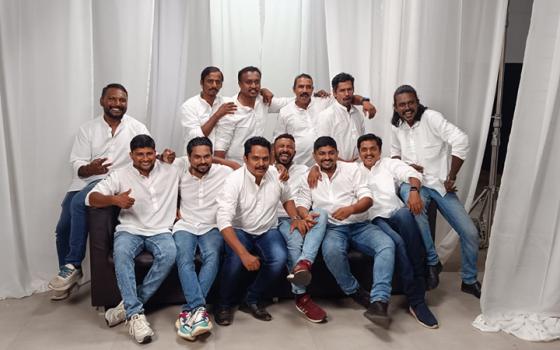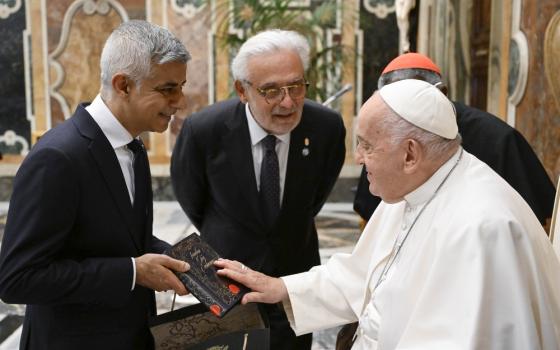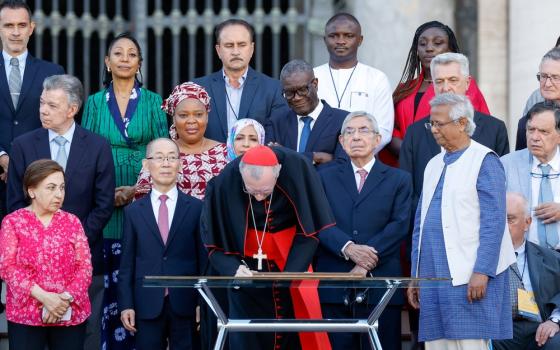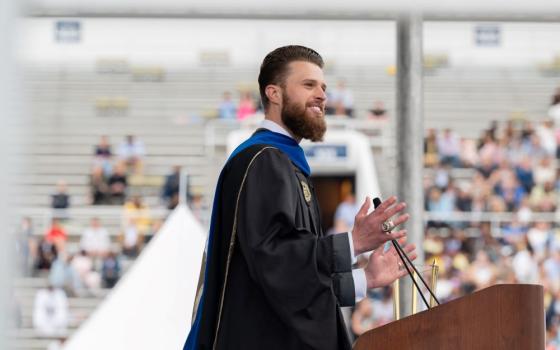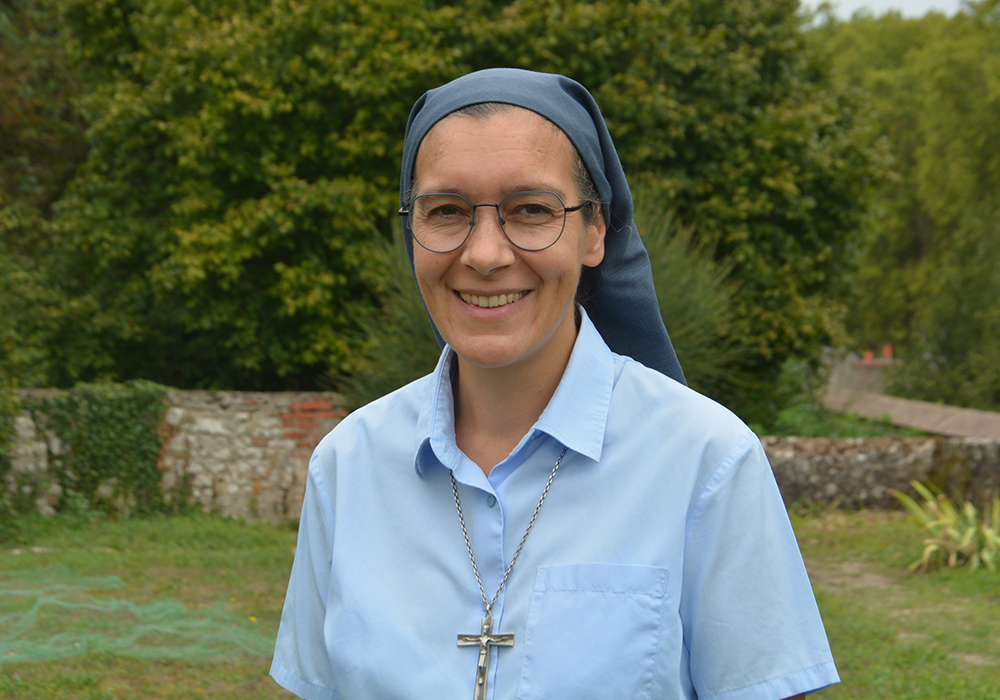
Sr. Laure Blanchon, pictured in this photo, is one of seven women theologians who recently published a book in France called Reform or Die, exploring ways for the Catholic Church to build a new future. (Courtesy of Laure Blanchon)
Seven women theologians recently published a book in France called Reform or Die, exploring ways for the Catholic Church to build a new future. The French Catholic church has been damaged by revelations of spiritual and sexual abuses that were unsanctioned, let alone condemned.
Many people do not want to be members of such an institution anymore. Some no longer go to church on Sunday. Mistrust towards the clergy is deep. Against this background, these women theologians have voiced their suggestions to help the church reform and be faithful to its mission.
Laure Blanchon, a sister from the congregation of the Ursulines de l'Union Romaine (Ursulines of the Roman Union), is one of these seven theologians calling for reform. "We simply have to read the Gospel and follow Jesus' example, mainly by paying attention to the most vulnerable people around us," she told Global Sisters Report.
Global Sisters Report met with Sr. Laure Blanchon in Paris, where she teaches dogmatic theology at Loyola's Jesuit university while living with her community in a convent in Beaugency, near Orleans.
GSR: Sister Laure, in this book, you say there are other victims the church doesn't hear. Referring to those whose lives have been shattered, who cannot get jobs and who have trouble making ends meet, you show how very poor people are often not welcome in our communities.
Blanchon: Nowadays, in France, Catholic communities have been rendered more fragile with the revelation of the scandals. Some people have quit, thinking they did not want to be part of such a church, and others only meet and celebrate with people like them. They tend to stay close to themselves and not welcome others, especially if they are different. We do not see many poor people taking part in the meetings preparing the synod.
Don't you think Catholic communities help people in need?
Yes, parishioners try to do a lot for people who are not as privileged as they are. But we have to do things together, not for the poor, but with the poor. We then experience their joy and their faith in God. We have to go back to the Gospel. Our priority is to follow Christ, and he showed us a way of friendship and proximity with people beaten up by life.
Do you fear we have forgotten the Gospel?
Each time we open the Gospel, we are struck by what we read: Everything is always about welcoming people and loving them the way they are. On every page, you find people beaten up by life. If we were to take out of the Gospel all the people who are not well, not many people would be left! Even the disciples, who later became the apostles, do everything wrong: They push people away from Jesus, people who want to see him, especially the poor, disabled, women and children.
Sometimes, I feel that we do the same in our churches and act like the disciples and do not want to see people who are different and disturb us. Fortunately, the Lord allows us to see that poor people are always there to provoke and question us.
Advertisement
How did you manage to welcome people not included in our parishes?
Of course, this did not happen overnight! Building trust demands time and the patience of little steps. Beaugency is a small town near Orleans, where my congregation is based and where I live. There is a large abbatial church in the old town and a little chapel in a neighborhood that is now very ordinary. Mass is celebrated every other Saturday in this chapel at 9 a.m. People who attend Mass there are very humble. They never go to the main church in town. Some of them live on welfare and look like homeless people or beggars.
After I had been in Beaugency for some months, I told them during Mass: If some of you would like to pray together and talk about the Gospel, we could meet here from time to time. Four people came to me after Mass and said they'd be interested. This kind of Bible study group exists in the main church, but these people feel they would not be welcome. They do not know how to talk well and are afraid of the way some people would look at them.
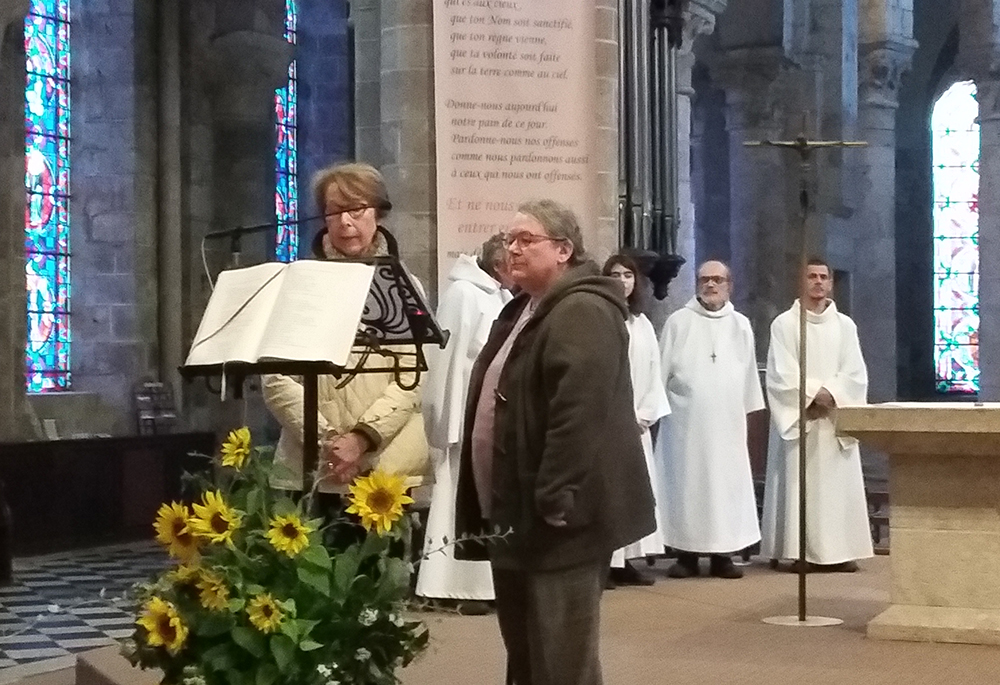
Women read at Mass during a feast of fraternity held at Sr. Laure Blanchon's parish. Blanchon had started a small Gospel study group with Massgoers from a chapel in a poor neighborhood in Beaugency. Blanchon's parish decided that members of her group would be at the center of the celebration of the World Day of the Poor in November 2023. The guests prepared the celebration of the Mass. (Courtesy of Laure Blanchon)
It is not always easy to meet people from different walks of life. As you said, our parishes tend to be rather tightly knit and do collections for poorer people, not with them. Your idea is to do things together. How do you manage this?
For two years, we have been meeting one Saturday a month. We first met in the chapel, which is in this poor neighborhood. Then, maintenance work had to be done in the chapel, so we moved to the convent, and now this is where we hold our meetings.
This is a small group of four to eight people. First, we exchange news. Most of them have to deal with serious issues. They have been through or still are in difficult situations. Then, we read a short text written by Fr. Joseph Wresinski, a priest who spent his life fighting for poor people's dignity and basic education. He is also the founder of the International Day for the Eradication of Poverty.
We share, for example, a text where Father Wresinski tells how he went to see someone because the light in his shack was still on, and found him praying after his stepson had died.
"This very poor man I had found praying in the middle of the night gave me God's grace, and I was the church that welcomes the grace of God for everybody. Christ tells us that without the very poor, there is no church. This man was the link between the church and God," Wresinski wrote in Les pauvres sont l'Église.
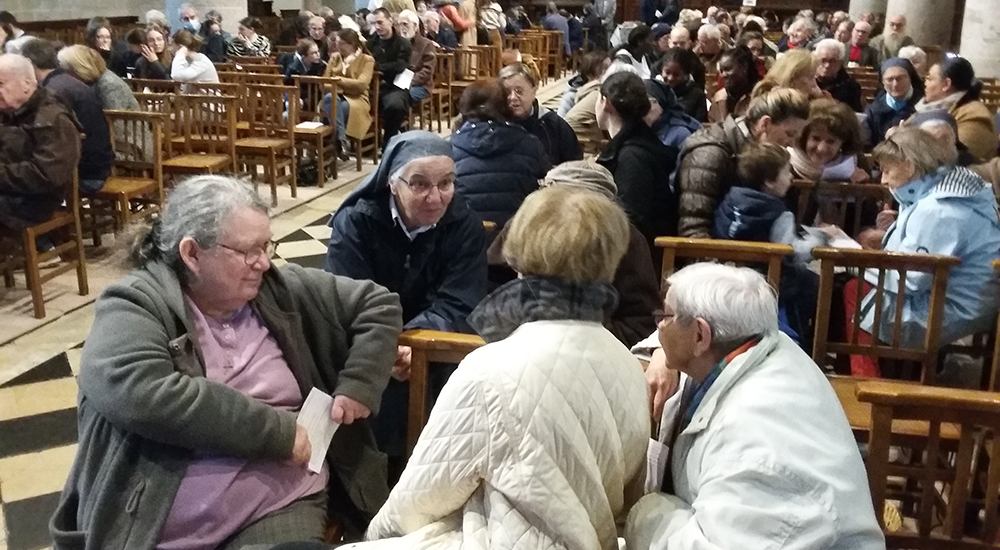
There was no homily during Mass at the feast of fraternity, but discussion of the readings and the Gospel occurred in small groups of people in the church. (Courtesy of Laure Blanchon)
What is their reaction when you read these words?
We comment on what we have heard, and then something extraordinary happens: They talk about their lives and what they have been through, which is something they have not done before. They try to see how the Lord was with them when they went through these trials and what they understood from what happened. It is a real exercise of sharing what they have experienced, and with the help of this text, it opens an opportunity to reread some events of their lives.
We then open the Gospel. Recently, we read the Gospel on the first Sunday of Lent. We read it little by little, we talked about it, I asked a few questions, we prayed and then it was time for an afternoon snack.
You say these people have a lot to contribute to our faith? How so?
Well, we tend to have a rather intellectual faith. Theirs is more spontaneous, and they have a way to thank God and praise him that we do not have anymore. By being friends with people who are vulnerable, I see that Jesus is present in my existence, and it is not just an idea, but it is a reality in the way they express it: "Oh, I found some cheese today, Jesus always provides!"
They can give thanks for what they have and pay attention to others: "I see this friend is not well, and this is Jesus suffering, so I have to go and help her." I have witnessed that people who go through trials and challenging times can discern God's presence in these situations even more than we do. Their trust in God is very radical. Their presence in the church is discreet, yet it feels like they are nurturing our communities with their simplicity and faith.
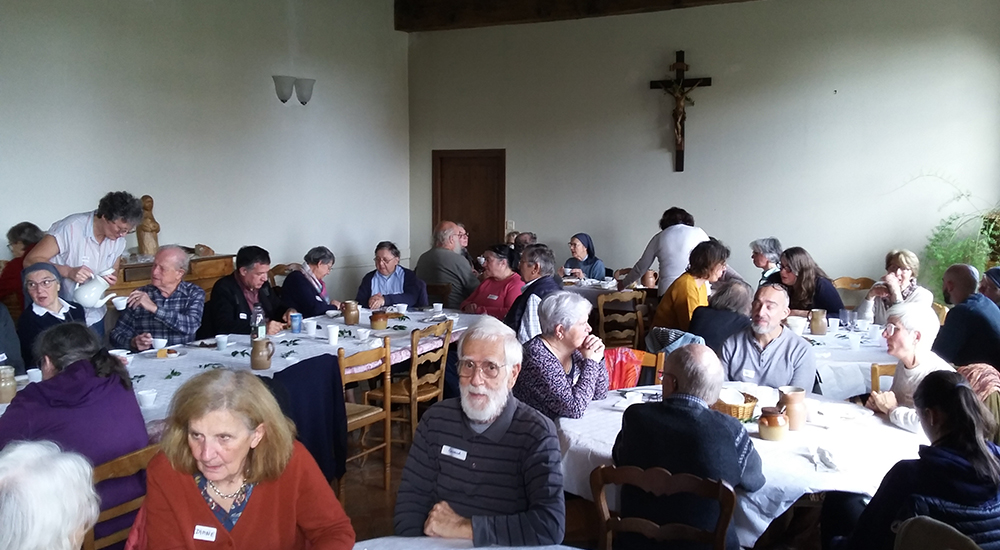
Lunch after Mass gave people an opportunity to get to know each other and experience community. (Courtesy of Laure Blanchon)
And your parish decided that this group of people would be at the center of the celebration of the World Day of the Poor last November.
They prepared the celebration of the Mass. There was no homily, just groups to discuss the Gospel. Then, we shared a meal. We had prepared soup for up to 40 people with the help of Caritas, and people who came brought food with them. We did not know how many would attend. Twenty? Thirty?
People from all walks of life came, some for Mass and the festivities, others only after Mass. When we sat down for lunch, we saw that very different people who did not know each other sat together. Later, some people who didn't really know the world of the poor told me they never had such an experience. Christians call it an experience of fraternity.
I think the banquet in the kingdom of God will look like this, and everybody will be welcome and happy!
Some people asked us when we would do it again. We don't know. We are not going to rush it, and we have to see how this experience makes its way into people's hearts. I believe more than ever in little steps. Such places, where faith is alive, could give us an idea of how we could rebuild our church, following the example of Christ.

